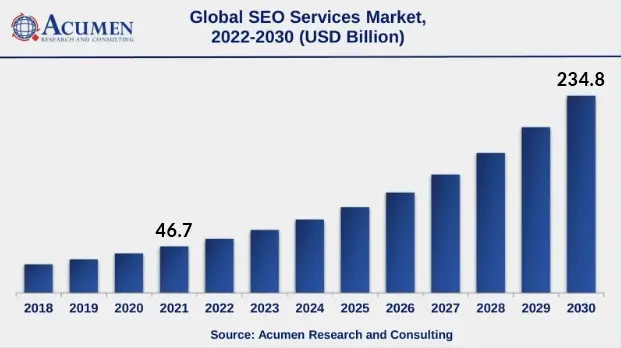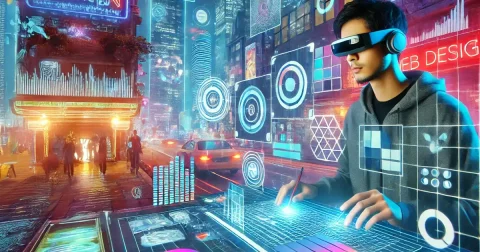
There’s no shortage of “Is Search Engine Optimization Dead?” articles and social media ads out there. The old man had a colourful phrase for such proclamations — nitrogenous waste. It’s a popular clickbait title, but they all predictably conclude the opposite to be true. In fact, the future of SEO is bigger and brighter than ever, and its importance to business is increasing dramatically. To meet this theory head on, let us gaze into Google’s crystal ball for some revealing projections.
“Overall, the SEO industry is primed for growth as it becomes an increasingly critical component of marketing budgets worldwide. The Global Search Engine Optimization Services market size collected $46.7 Billion in 2021 and is set to achieve a market size of $234.8 Billion in 2030, growing at a compound annual growth rate (CAGR) of 17.6% from 2022 to 2030.” (Source: Acumen Research)

There’s a number of industry valuations out there, and they all paint the same picture. North America, in particular, is looking at exceeding global numbers with an even higher CAGR. All of which points to a future of staggering growth for SEO.
The Future of Search Engine Optimization
Businesses thrive or struggle based on their online visibility. Search Engine Optimization (SEO) has emerged as a pivotal strategy, and boasting substantial ROI. As search engines continually refine their algorithms and user expectations evolve, the role of SEO is undergoing a transformative shift.
The need to optimize for search has escalated to becoming more critical than ever as consumers turn to an expanding number of search destinations other than Google. Some of the more prominent platforms include YouTube, Facebook, Reddit, Amazon, Yahoo, and Bing. Accounting for evolution is a strategic necessity for businesses seeking to capture and retain their target audience’s attention.
Now you can put away your calculator as we explore how trends, technologies, and strategies are shaping the way we optimize for search engines.
Evolution of Search Engines
Search engines have come a long way since their inception in 1990 by Alan Emtage, a student at McGill University in Montreal. From simple keyword-based systems to sophisticated algorithms that consider user intent, the rapid evolution has been nothing short of remarkable. As search engines evolve, SEO practices must adapt to keep up with the changing landscape. This adaptation is not just a choice, but a critical necessity for businesses aiming to stay relevant.
Understanding the intricate algorithms governing search engine rankings is no small feat. Adapting strategies to accommodate algorithmic shifts is essential for maintaining visibility and relevance.
Current SEO Landscape
In the present scenario, effective SEO involves a combination of on-page SEO and off-page optimization techniques. At the heart of SEO lies content—content that is relevant and resonates with your audience, embodies search intent, and plays nice with search engines. Crafting content that seamlessly integrates strategic keywords and delivers genuine value is a cornerstone of modern optimization. It’s about going beyond mere words; it’s about crafting compelling narratives that answer questions, solve problems, and evoke engagement.
Additionally, there are factors such as mobile-friendliness and user experience that contribute notably to a website’s search engine ranking.
Off-page optimization includes acquiring a network of authoritative, high-quality backlinks that are pivotal for enhancing domain authority and online visibility. Search engine algorithms view backlinks as ‘votes’ — digital endorsements from reputable sources that vouch for your credibility and expertise.

Future of SEO and Emerging Trends in SEO
The future of SEO is taking shape with some exciting trends. Here are a few of the more notable ones.
- Voice search is becoming more prevalent, prompting the need for conversational keywords. Optimizing for voice-assisted devices and leveraging conversational keywords are becoming indispensable tactics.
- Artificial Intelligence (AI) and machine learning are predictably making their mark. Machine learning algorithms are revolutionizing content creation, conversational keywords and optimization strategies. Further, predictive analytics powered by AI provide insights that help marketers refine their SEO strategies, making them more efficient and effective.
- Featured snippets and rich results are changing the way users interact with search results. Crafting content that aligns with feature snippets and visual appeal that utilizes structured data are areas that serve as beacons by offering prominent visibility in search results.

Talk Strategy with a Fractional CMO
SEO. More SEO traffic with higher conversion rates.
Paid Media. Paid strategies with clear ROI.
Content. Epic content that attracts and gets shared.
User Intent and Semantic Search
Decoding Desire
Understanding user intent is the key to delivering valuable solutions for SEO success. Search engines are increasingly adopting semantic search techniques to grasp the context behind search queries. It’s not just what users are searching for, but also why they’re searching for it. Every query is a window into the minds of your audience—a reflection of their needs, desires, and pain points. Crafting content that aligns precisely with these intentions is a strategic engagement that transforms casual browsers into committed enthusiasts. Navigating the labyrinth of user intent means uncovering the motivations that underlie search queries, then shaping your content into an informed, persuasive response that satisfies those motivations in a way that no algorithm can emulate.
Semantic Symphony
The evolution of search engines has transcended mere keyword matching. Today, it’s about understanding the context, semantics, and nuances that define user queries. Semantic search, the art of comprehending the intricacies of language, is the linchpin of this transformation. Keywords have evolved into concepts, and search engines now decipher not just what words are typed, but what concepts are sought. This shift necessitates a move from rigid keyword optimization to a more holistic approach. It’s about capturing the essence of user needs through holistic, semantic content. The semantics-driven strategy resonates with both users and search engines, culminating in enhanced visibility and credibility. By embracing the semantic symphony, businesses are poised to deliver content that transcends mere information, creating an experiential journey that caters to the genuine needs of their audience.
Technical SEO Advancements
Technical SEO is already an activity to be aware of, but gaining prominence. Page speed, mobile optimization, structured data, and schema markup are now integral components of SEO that directly influence user satisfaction and engagement. Google’s emphasis on Accelerated Mobile Pages (AMP) further highlights the importance of seamless user experiences across devices that not only keep visitors on your site longer but also enhances the likelihood of conversions.
Search engines are not just interpreting content—they’re deciphering context. By incorporating structured data and schema markup, businesses have the power to provide explicit context to search engines, making their content more comprehensible and relevant. As the digital ecosystem evolves, the importance of structured data becomes even more pronounced. It is a beacon that guides search engines through the intricacies of your content, ensuring that your offerings are showcased effectively in rich snippets, featured snippets, and other prominent formats.
Personalization and Localization
Customized Experiences for Enhanced Engagement
Personalization is poised to become a driving force that shapes user engagement and search engine rankings. Today’s users are no longer satisfied with generic experiences; they demand content and solutions tailored to their preferences and needs. As search engines refine their algorithms to decipher user intent, the ability to deliver personalized content is front and center. By understanding user behaviour, demographics, and preferences, businesses can craft tailored experiences that resonate. The rewards are substantial—an increase in engagement, longer visit durations, and higher conversion rates.
The Significance of Local Optimization
Location-based search is no longer a trend—it’s an integral component of contemporary SEO strategy, and its importance is set to amplify in the future. With the surge in mobile search and the growing reliance on voice assistants, users are frequently seeking information, products, and services based on their geographic proximity. Optimizing for local search isn’t limited to brick-and-mortar establishments; even digital businesses can reap the benefits of local SEO. By enhancing visibility in local search results and leveraging platforms like Google My Business, businesses can capture the attention of users precisely when they are seeking relevant offerings nearby. The future of SEO is deeply intertwined with location-centric optimization, making it a potent tool for establishing digital authority and driving real-world foot traffic.

Video and Visual Search
The Visual Revolution
As the future of SEO unfolds, the dominance of video content is set to reshape the traditional text-based content landscape. Videos are not merely supplementary; they are transformative mediums that captivate, educate, and inspire. With platforms like YouTube reigning as search engines in their own right, optimizing for video content becomes pivotal. Videos present an immersive storytelling avenue, enabling businesses to convey complex information with simplicity and emotional resonance. By optimizing video titles, descriptions, and tags with relevant keywords, businesses can ensure their visual content surfaces prominently, driving engagement and expanding reach.
Visual Search: A New Frontier in Discovery
In the imminent future, search is set to transcend text and voice, embracing the power of images. Visual search technology—where users seek information by capturing or uploading images—heralds a new era of search interaction. As users increasingly rely on their smartphone cameras and search engines evolve to process visual data, optimizing for visual search presents itself as an opportunity. Techniques such as image optimization and alt text descriptions will enable businesses to position themselves for enhanced visibility. Visual search presents novel ways for users to discover products, places, and information, and those who strategically taking advantage of visual SEO are poised to secure a competitive edge.
Metrics and Analytics
Diversifying Success Metrics
SEO success is no longer solely measured by keyword rankings. While rankings remain a pivotal indicator of visibility, the future demands a more comprehensive assessment. Diversifying the spectrum of success metrics to encompass user engagement, click-through rates, conversion rates, and even brand sentiment is paramount. These metrics collectively paint a vivid picture of a website’s impact on its audience. The ultimate goal of SEO is not just to be seen but to be embraced. Understanding these metrics allows for better-informed decisions and the ability to fine-tune strategies.
Actionable Insights
Data without actionable insights is simply noise. The future of SEO hinges on the ability to extract meaningful, actionable insights from the wealth of analytics at your disposal. By deciphering patterns, identifying trends, and understanding user behaviour through data, businesses can craft strategies that are not based on assumptions but rooted in evidence. This data-driven approach empowers businesses to optimize with precision, pivot with purpose, and refine with foresight. As the future of SEO unfolds, those who harness the power of data analytics will lead the charge toward a more effective, efficient, and impactful online presence.
Integrated Digital Marketing
Amplifying SEO’s Impact
SEO doesn’t operate in isolation. It complements other digital marketing channels like Pay-Per-Click (PPC) advertising, social media and content marketing—amplifying the impact of each individual effort. Integrating these efforts creates a holistic approach that amplifies the impact of each strategy, resulting in a stronger online presence by fostering brand recognition, trust, and engagement. By aligning these facets, businesses can cultivate a comprehensive digital ecosystem that captures the attention of their audience at every turn, driving visibility and conversions.
Orchestrating a Comprehensive Footprint
Gone are the days when isolated marketing efforts sufficed. The future belongs to those who embrace a holistic approach, recognizing that a brand’s digital presence is greater than the sum of its parts. Integrated digital marketing is more than just a strategy; it’s a mindset that envisions every marketing facet as interconnected nodes working in concert. Whether it’s leveraging SEO to complement PPC campaigns or utilizing social media to amplify content reach, the integrated approach nurtures a synchronized rhythm that resonates with the audience. This orchestration optimizes visibility while crafting an immersive brand experience that lingers long after the initial interaction.
Future-Proofing Your SEO Strategy
Search engine algorithms are dynamic, and major updates can impact rankings overnight. Staying informed about these changes and adapting quickly is crucial to success. Building out a resilient SEO strategy that can weather algorithmic storms is essential for maintaining consistent visibility.
To thrive in the future of SEO, businesses need a forward-looking approach. Flexibility is key as trends and technologies evolve. Continuous learning and adaptation are essential, ensuring that your SEO strategy remains effective in the face of ever-changing algorithms.
Conclusion
In a landscape of constant technological evolution and emerging trends, maintaining a proactive stance is essential to stay ahead of the curve to maintain a competitive edge. The future of SEO promises innovation and transformation. As search engines become smarter and user expectations shift, staying ahead requires embracing emerging trends, leveraging AI, and maintaining ethical and user-centric practices. The pursuit of excellence in SEO is an unending expedition, but the limitless advantages are boundless. As the latin proverb describes – fortune favours the bold!







